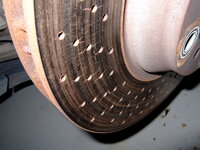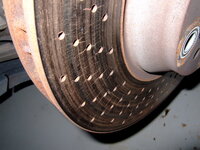As my car has pretty much brand new discs and pads all round, if somewhat corroded and manky looking, I wanted to clean them all up and also paint the calipers and hub areas...
This got me thinking, as a while back I drilled a set of discs for my brother's R19...
Now I know drilled discs are inherently weaker, BUT dimpled or grooved ones offer a lot of the benefits without the loss of strength..
So, I have a drill press, and have ordered a 12mm ball ended mill bit.... But has anyone done this, if so, did you download a template or make your own?
Comments welcome...
Mike
This got me thinking, as a while back I drilled a set of discs for my brother's R19...
Now I know drilled discs are inherently weaker, BUT dimpled or grooved ones offer a lot of the benefits without the loss of strength..
So, I have a drill press, and have ordered a 12mm ball ended mill bit.... But has anyone done this, if so, did you download a template or make your own?
Comments welcome...
Mike

